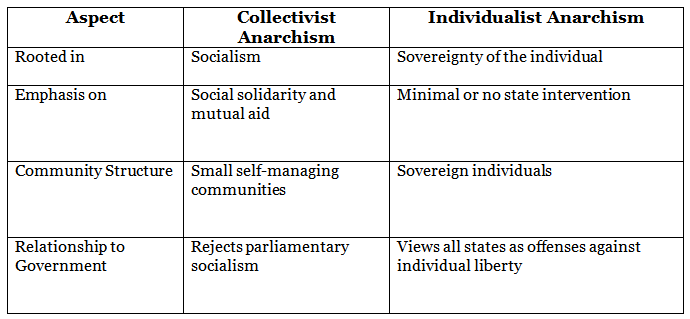Anarchism: Political Ideologies | Philosophy Optional for UPSC PDF Download
Anarchism: A Philosophy of Freedom and Statelessness
Introduction to Anarchism
- "Anarchism," rooted in the Greek term "without rule," is a philosophical system that challenges all forms of political authority, particularly the state. It advocates for a society without rulers, deeming the state evil and unnecessary.
- Anarchism is fundamentally grounded in the pursuit of freedom and equality, viewing the state as a repository of coercive and compulsory authority.
- Its core tenet is unrestricted personal autonomy, believing that order and social harmony can emerge naturally rather than through imposed government control.
- Anarchism's utopian character reflects an optimistic outlook on human nature.
Historical Context
- Anarchism has ancient origins but gained prominence as a social movement in the 19th century. Notably, it has never successfully attained political power, unlike other ideologies such as liberalism, socialism, and fascism.
Challenges and Appeal
- Anarchism's appeal is limited by its perceived unrealistic goals: overthrowing the state and abolishing all forms of political authority.
- In terms of means, anarchists reject conventional political methods like forming parties or contesting elections, considering them corrupting. This self-imposed exclusion from conventional politics limits their strategic advantages.
Enduring Influence
- Despite these challenges, anarchism endures due to its unwavering opposition to authority, which resonates, particularly among youth and anti-capitalist movements.
Core Themes of Anarchism
Anti-statism: Challenging Authority
- Anarchism's defining feature is its staunch opposition to the state, advocating for a society where individuals manage their affairs voluntarily, free from compulsion or coercion.
- Authority is considered an offense against freedom and equality, as it enslaves, oppresses, and corrupts both those subject to authority and those in power.
Natural Order: Human Potential
- Anarchists believe in the innate rationality of human beings, suggesting that the government, rather than human nature, fosters injustice, greed, and aggression.
- They align with Rousseau's famous assertion that "Man was born free, yet everywhere he is in chains."
Anti-clericalism: Opposition to Religious Authority
- Anarchists harbor resentment not only toward the state but also religious institutions. Religion's imposition of moral principles and codes of conduct represents a form of authority.
- Abolishing both church and state is seen as a crucial step toward true societal liberation.
Economic Freedom: Varieties of Anarchism
Anarchism is divided into two major traditions: collectivist and individualist.
Collectivist Anarchism:
- Rooted in socialism, it emphasizes human capacity for social solidarity and mutual aid.
- Promotes small, self-managing communities based on sharing and direct democracy.
- Shares commonalities with socialism but diverges on key points, such as the rejection of parliamentary socialism.
Individualist Anarchism:
- Grounded in the sovereignty of the individual, it rejects the need for government to police society and advocates for minimal or no state intervention.
- Unlike liberalism, which argues for constitutional and representative government, anarchists view all states as offenses against individual liberty.
Libertarianism: The Sovereign Individual:
- Developed by thinkers like Henry David Thoreau, it embraces the idea that "government is best which governs least." Individualism leads to civil disobedience, where individuals follow their consciences rather than societal or governmental demands.
Anarcho-capitalism: Market Replaces Government:
- Influenced by anarchist principles, anarcho-capitalism suggests that government can be replaced by unregulated market competition.
- Believes competitive, privately-owned protection agencies can offer superior services, driven by consumer choice and competitive pricing.
Difference Between: Collectivist vs. Individualist Anarchism
These central themes and traditions provide a comprehensive understanding of the diverse aspects of anarchism and its place in political philosophy.
Anarchism in the 21st Century: A Reevaluation
Anarchism's Contemporary Relevance
In the 21st century, it may be tempting to dismiss anarchism as irrelevant, particularly since it hasn't succeeded in directly shaping major societies' political reconstructions. However, the enduring significance of anarchism lies not in its ability to acquire and retain political power but in the challenges it has posed, leading to the growth of other political ideologies. Anarchists have been instrumental in highlighting the coercive, destructive, and exploitative nature of political authority.
Anarchism's Ideological ImpactSome may argue that anarchism is merely a reservoir of ideas with limited philosophical importance. However, a more optimistic perspective reveals its relevance in addressing contemporary issues such as pollution, environmental destruction, urban development, gender equality, and global inequalities. Many modern social movements, including the anti-capitalist and anti-globalization movements, have embraced anarchist principles. Notably, influential figures like Noam Chomsky, who has significantly influenced the anti-globalization movement, have developed their ideas based on anarchist assumptions.
|
60 videos|168 docs
|
















